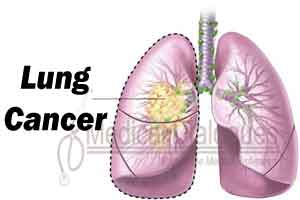- Home
- Editorial
- News
- Practice Guidelines
- Anesthesiology Guidelines
- Cancer Guidelines
- Cardiac Sciences Guidelines
- Critical Care Guidelines
- Dentistry Guidelines
- Dermatology Guidelines
- Diabetes and Endo Guidelines
- Diagnostics Guidelines
- ENT Guidelines
- Featured Practice Guidelines
- Gastroenterology Guidelines
- Geriatrics Guidelines
- Medicine Guidelines
- Nephrology Guidelines
- Neurosciences Guidelines
- Obs and Gynae Guidelines
- Ophthalmology Guidelines
- Orthopaedics Guidelines
- Paediatrics Guidelines
- Psychiatry Guidelines
- Pulmonology Guidelines
- Radiology Guidelines
- Surgery Guidelines
- Urology Guidelines
Low-dose aspirin for long duration lowers lung cancer risk: JAMA

KOREA: There have been many controversies regarding the use of low-dose aspirin for chemoprevention of lung cancer risk. Putting to rest all these controversies, a recent study in the journal JAMA has found that using low-dose aspirin for 5 to 9 years was indeed associated with decreased risk of lung cancer. This effect was particularly seen in the elderly and people without diabetes, however, the observed effect size was quite modest.
The mechanism behind this could be the inhibition of cyclooxygenase-mediated platelet activation by aspirin. Inhibition of arterial thrombosis by aspirin impedes the development and progression of certain cancers. Some randomized trials have shown a benefit for long-term, low-dose aspirin use, but epidemiological and cohort studies, especially in women, have shown no benefit.
Shinhee Ye, School of Medicine, Ewha Woman's University, Seoul, Republic of Korea, and colleagues conducted this study to investigate the association between low-dose aspirin use and lung cancer risk, and to identify specific subgroups that may derive the most benefit from low-dose aspirin use. For this, the researchers used a national database to identify nearly 13,000,000 patients for whom information on aspirin use and lung cancer diagnoses was available. Low-dose aspirin use was defined as doses of ≤100 mg daily, at least 2 days per week.
During a mean 5-year follow-up, a total of 63 040 participants with a mean (SD) age of 66.4 (9.3) years received a diagnosis of lung cancer. Of these, 45 156 (71.6%) were men.
Key findings of the study include:
- The incidence rate of lung cancer was 98.8 per 100 000 person-years.
- The duration of low-dose aspirin use was none for 10 987 417 participants (84.7%), 1 to 2 years for 750 992 participants (5.8%), 3 to 4 years for 506 945 participants (3.9%), 5 to 6 years for 371 062 participants (2.9%), 7 to 8 years for 240 528 participants (1.9%), and 9 years for 112 456 participants (0.9%).
- Compared with no aspirin use, 5 to 6 years, 7 to 8 years, and 9 years of aspirin use were significantly associated with reduced lung cancer risk.
- After stratified analysis, a significant reduction of lung cancer risk was observed among people aged 65 years or older and among people without diabetes.
"Although the use of low-dose aspirin for more than 5 years was associated with decreased risk of lung cancer, particularly among elderly participants and among people without diabetes, the observed effect size was quite modest," write the authors.
"Future prospective studies are needed to determine whether there is a causal association," they concluded.
For detailed study follow the link: https://doi.org/10.1001/jamanetworkopen.2019.0185

Disclaimer: This site is primarily intended for healthcare professionals. Any content/information on this website does not replace the advice of medical and/or health professionals and should not be construed as medical/diagnostic advice/endorsement or prescription. Use of this site is subject to our terms of use, privacy policy, advertisement policy. © 2020 Minerva Medical Treatment Pvt Ltd